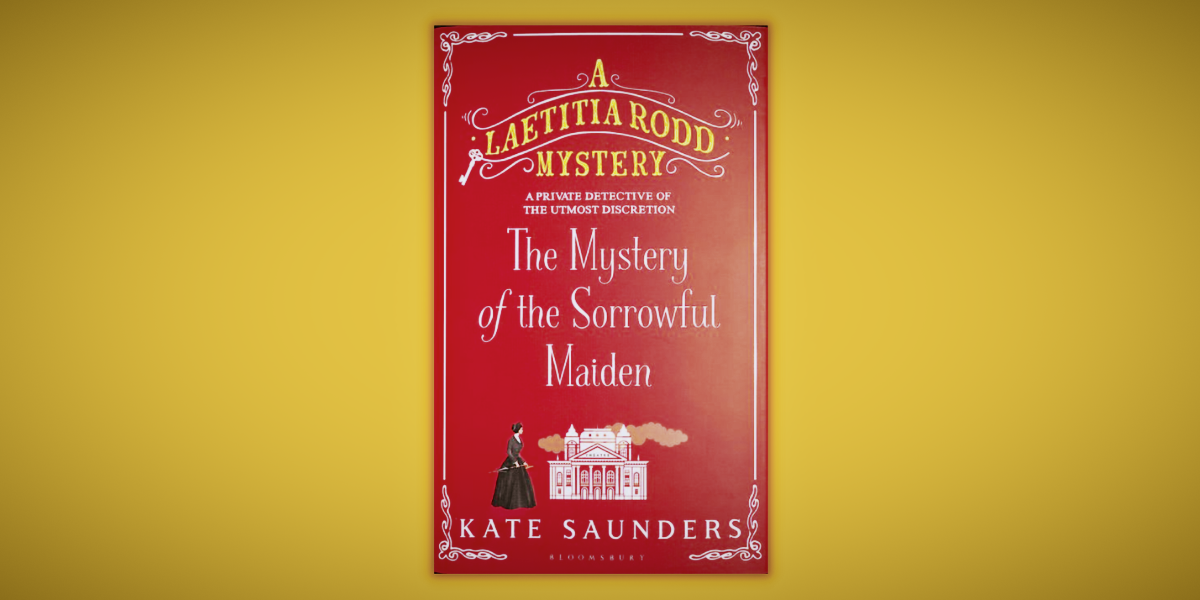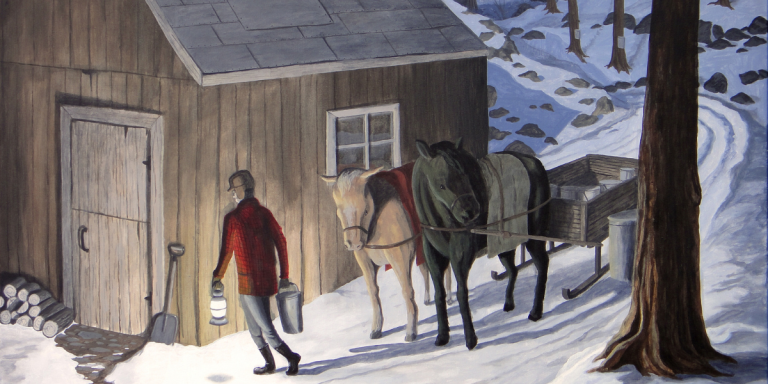Read the Excerpt: The Mystery of the Sorrowful Maiden by Kate Saunders
 one
one
1853
Spring was a long time coming that year. Though the winter had not been especially cold, it had been so damp that everything I touched seemed to be speckled with black mould, and Mrs Bentley had suffered a bad attack of pleurisy. By the time she was well enough to come downstairs and sit beside the kitchen fire it was the week after Easter, and a few timid rays of sunshine had finally pierced the general gloom.
After I had settled Mrs B in the Windsor chair, wrapped in a heap of shawls and blankets, I found a letter, hand- delivered, on the doormat:
Dear Mrs Rodd
I understand that you have a reputation as a private investigator, specializing in matters requiring discretion. If convenient to you, I shall call this afternoon at three o’clock, to discuss the possibility of a professional engagement.
Yours respectfully Benjamin Tully
Mr Tully, a retired actor, was one of our neighbours in Well Walk. We exchanged bows and smiles when we met in the street, but he was far better acquainted with Mrs Bentley, and so I gave the letter to her. ‘Do you happen to know what he wants, Mary?’
It was exactly the tonic my dear landlady needed; I rejoiced to see the ‘snap’ returning to her pale blue eyes as she pored over the single sheet of paper.
‘No, ma’am; your guess is as good as mine. But Mr Tully’s a nice sort of fellow, and a good neighbour too. he keeps those cats, for one thing, and this terrace hasn’t seen a mouse for years.’
‘Should I receive him in the drawing room, or will he be more comfortable down here? Dear me, I don’t know what to do with an actor!’
In those days, theatrical people were still regarded as a race apart, both morally and socially. Though certain actors were starting to be considered as serious artists, it would not be appropriate for them to be received as equals by someone like me – the widow of an archdeacon and the very epitome of respectability.
‘I’d say down here, ma’am,’ said Mrs Bentley decidedly. ‘If you sit in the drawing room, it’ll mean another fire, which we can’t afford – because that coal merchant you like so much is an out-and-out robber.’
I laughed at this, for it made me so happy that she was well again, and up to criticizing. She had nearly died, and I would have been grievously lonely without Mary Bentley; our friendship amounted to so much more than the usual bond between a landlady and her lodger. When we first met, five years before the time of which I am writing, I had just lost my beloved husband and was almost penniless.
Everyone had expected me to move into my brother’s house in highgate. Fred’s wife had assumed that I would then teach her swarms of children for nothing out of ‘gratitude’ and she could dismiss the governess. Much as I loved those children, however, I was having none of it; independence was everything to me, and so I set about looking for lodgings.
And a dismal experience I found it; I will spare the reader a complete account of the mean and shabby little rooms, the slatternly landladies and shocking prices. Mrs Bentley’s narrow house in hampstead did not appear especially promising at first glance, but it suited me, and so did she; I was pleased to learn that many years before, when her five red-headed sons were small, she had let lodgings to John Keats and his two brothers (how they all fitted in is still a mystery to me) and I had taken this as a hopeful omen.
Mr Tully had been living in Well Walk, four doors down from us, for ten years. He was an odd-looking little man, small and slight of build, with a silken floss of grey hair and bright blue eyes in an innocent, ageless face. His movements were quick and graceful, though he was lame in one leg and walked with the aid of a cane. He knocked briskly on the door at precisely three o’clock, carrying a seed cake on a plate, which he presented to me with a bow. ‘I made it this morning, Mrs Rodd; I know Mrs Bentley’s fond of my seed cake.’
He did not mind in the least that I led him downstairs to the kitchen, but bowed to Mrs B with a courtly flourish, and settled easily beside the fire. His cake was excellent; soft and sweet and moist, with just the right quantity of caraway to give it a delicate flavour. I was very pleased that Mrs B accepted a slice, for her lack of appetite was a constant worry to me.
‘I hope you can forgive my approaching you directly,’ said Mr Tully. ‘I’m doing it on behalf of a very old friend, who knows your reputation for discretion.’ He raised his eyebrows in a meaningful way. ‘She – this old friend – is acquainted with a family by the name of Heaton.’
Mrs Bentley and I exchanged sharp glances; the Heaton case had been my first great success as a private investigator, and it was still (as Mrs B liked to say) bringing in customers.
‘Not that my friend’s situation is in any way similar,’ Mr Tully said quickly. ‘There are no dead bodies – no actual crimes at all, in fact. it’s simply a … a situation that requires very careful handling.’
‘Of course I understand, Mr Tully,’ I hastened to assure him. ‘I do not sit in judgement, and it’s next to impossible to shock me. how may I help you?’
‘This friend of mine,’ he said, ‘is very well known in theatrical circles; her name is Transome.’
‘As in Thomas Transome?’ I knew very little about the theatre, but even I had heard something of this celebrated actor-manager.
‘Yes, ma’am.’ His eyes had a gleam of pride. ‘Thomas Transome and his family hold the lease of the Duke of Cumberland’s Theatre in the haymarket. Before my retirement from the stage, I spent some very happy years with his company.’
‘Tell her about the fire,’ said Mrs Bentley.
‘Dear me, yes,’ said Mr Tully. ‘Ten years ago, when we were still at the King’s Theatre in Drury lane, there was a terrible fire – the cause of my retirement.’ He placed a hand upon his lame leg. ‘I was badly injured; my memory of that night is imperfect, but Tom Transome always said I saved his life. Whether I did or not, he staged a grand benefit performance and gave me the proceeds so that I could live out my days in comfort. he is capable of great generosity.’
‘Indeed.’
‘But I won’t talk about the theatre; Mrs Bentley thinks theatres are sinful places. And I’m not calling on Tom’s behalf. My friend is his wife, Mrs Sarah Transome.’
‘You must forgive my ignorance,’ I said. ‘Do I take it that she acts too?’
‘She does, ma’am – in her day, she was a great actress – one of the very best. And her three daughters are also on the stage.’
‘Why does she need my services, Mr Tully?’ he was sorrowful now. ‘To put it plainly, because Tom Transome has fallen in love.’
‘I beg your pardon?’ I had not expected this, and had no idea how to respond.
‘He has fallen head-over-ears in love with a girl by the name of Constance Noonan, who is currently playing Juliet to his Romeo. She is eighteen years old. Tom has had what you might call “intrigues” with certain actresses in the past – but he always kept them out of the way of his wife. This is different. he has quite lost his mind, and is talking about setting up home with this girl.’
‘Disgraceful!’ said Mrs Bentley.
‘I’m inclined to agree,’ I put in, not wanting to discourage Mr Tully when he was just getting up steam. ‘But we ought to suspend any judgement until we have heard the facts – why does Mrs Transome need my assistance?’
‘She needs someone to speak up for her interests.’ His pale face reddened a little. ‘Her husband wants to turn her out of the house.’
Mrs B’s lips formed the word ‘disgraceful’.
‘Has he cited any reason for turning her out, apart from his own infidelity?’ I asked.
‘He has accused Mrs Sarah of being a neglectful mother to her girls when they were small children,’ said Mr Tully. ‘Which is arrant nonsense, and simply his latest attempt to do her out of what is rightfully hers. She needs to consult a lady like yourself, with whom she can be absolutely candid.’
‘Oh, you can’t shock her!’ said Mrs B, nodding at me. ‘She’s very troubled, Mrs Rodd! it makes my heart ache sometimes, to see her so anxious and unhappy. Tom is angling for a legal separation, on terms that are frankly stingy; I don’t know what’s got into him! And she doesn’t know who she can trust.’
‘What about the daughters; don’t they live with her?’
‘Only the youngest, Cordelia, aged nineteen and Tom’s pride and joy; she’s not speaking to her father, and that has only made the situation worse. The middle sister, Olivia, at the tender age of twenty-four, has taken Tom’s side and left her mother’s house. And the oldest, Maria – now Mrs Maria Betterton – is away in America, on tour with her husband. She is twenty-seven. She sent her father a letter that made him furious, to the point of smashing things. The name “Betterton”, of course, only added insult to injury!’ he nodded at us knowingly, saw our blank faces, and went on, ‘There is a famous feud between the Transome and Betterton families, strikingly similar to the state of affairs between the Montagues and the Capulets.’
‘Let us return to the requirements of Mrs Sarah Transome.’ I sensed this was a tale that could fly off in a hundred directions, and it was important to keep things as simple as possible. ‘I would be very happy to meet her, and to speak on her behalf in the matter of making a settlement – if I can be of real help.’
‘Thank you!’ cried Mr Tully, radiant with relief. ‘You will find her at home in Pericles Cottage, ham Common, on any day convenient to you.’
My conscience troubled me that evening. I was the widow of an archdeacon, and dignitaries of the Church did not frequent places of public entertainment. My beloved Matt could never conquer a sneaking fondness for such places, and had occasionally ‘treated’ our nephews to a pantomime, but this did not mean he approved of the theatrical world. I could not help knowing he would not have approved of my involvement with the Transomes.
On the other hand, Mrs B’s illness had been costly (I had not told her the half of it), and I needed the money – yes, the argument that so often trumps all the others. This was my excuse for taking on one of the saddest cases I have ever encountered, though it was not sad to begin with.
In true theatrical style, the programme commenced with a farce and ended with a tragedy.
Order the Book
In the spring of 1853, private detective Laetitia Rodd receives a delicate request from a retired actor, whose days on the stage were ended by a theater fire ten years before. His great friend, and the man he rescued from the fire, Thomas Transome, has decided to leave his wife, who now needs assistance in securing a worthy settlement. Though Mrs. Rodd is reluctant to get involved with the scandalous world of the theater, she cannot turn away the woman in need. She agrees to take the case.
But what starts out as a simple matter of negotiation becomes complicated when a body is discovered in the burnt husk of the old theater. Soon Mrs. Rodd finds herself embroiled in family politics, rivalries that put the Capulets and Montagues to shame, and betrayals on a Shakespearean scale. Mrs. Rodd will need all her investigatory powers, not to mention her famous discretion, to solve the case before tragedy strikes once more.
By clicking 'Sign Up,' I acknowledge that I have read and agree to Hachette Book Group’s Privacy Policy and Terms of Use





